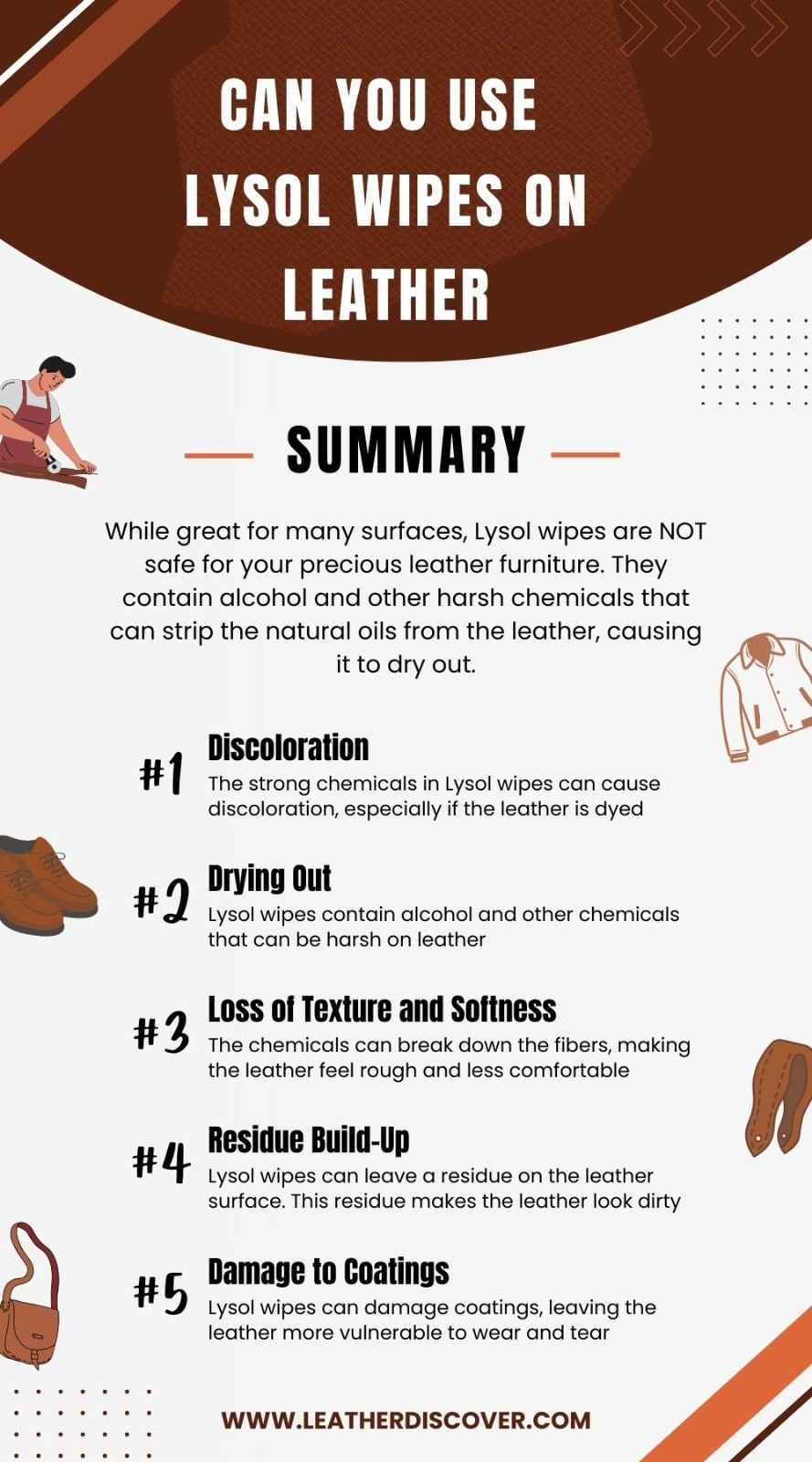We all know the convenience of Lysol wipes. They’re a lifesaver for quick cleanups.
But before you grab a wipe and clean that dusty leather couch, hold on a second!
While great for many surfaces, Lysol wipes are NOT safe for your precious leather furniture.
They contain alcohol and other harsh chemicals that can strip the natural oils from the leather, causing it to dry out.
This can lead to cracking and brittleness over time.
I once tried using Lysol wipes on my favorite leather wallet after it fell on a dirty floor. Big mistake!
The leather dried out and lost its rich color, making me wish I had used a proper leather cleaner instead.
In this blog post, we explore how Lysol wipes could wreak havoc on your beloved leather, and what gentler alternatives you can use to keep your couch clean and beautiful.

The Ingredients of Lysol Wipes
Lysol wipes typically contain several active ingredients that contribute to their disinfecting power. The most common ones include:
Ethanol/Isopropyl Alcohol: These are powerful disinfectants that kill germs and bacteria, But they’re also notorious for drying out materials. Leather relies on its oils to stay soft and supple. When these alcohols strip away those oils, the leather can become dry.
Benzalkonium Chloride: These chemicals are excellent disinfectants, but they can be too harsh for leather. They can break down the natural fibers in leather, altering its texture and making it less smooth
Fragrances and Surfactants: Fragrances might make things smell nice, but can also irritate and damage leather. Some fragrances can react with the leather’s surface, leading to discoloration or a sticky texture. While surfactants help in cleaning, they can leave behind a residue that’s not good for leather.
Risks of Using Lysol Wipes on Leather
If you’re a leather lover or just someone looking to keep your leather goods in top shape, this is crucial information.
1. Drying Out
Lysol wipes contain alcohol and other chemicals that can be harsh on leather.
Leather needs to retain its natural oils to stay supple and flexible. Lysol wipes can strip away these oils, leading to dry, cracked leather over time.
I learned this the hard way with my beloved leather wallet. After a few wipes, it started looking like a desert landscape – dry and cracked.
2. Discoloration
Ever notice how certain cleaning products can leave marks or even discolor surfaces? The same risk applies here.
The strong chemicals in Lysol wipes can cause discoloration, especially if the leather is dyed.
Imagine your favorite leather jacket or those expensive leather seats in your car ending up with ugly patches – not a pretty picture!
3. Loss of Texture and Softness
Leather is cherished for its luxurious texture and softness.
When you use harsh cleaning products like Lysol wipes, you risk losing them.
The chemicals can break down the fibers, making the leather feel rough and less comfortable.
4. Residue Build-Up
Lysol wipes can leave a residue on the leather surface.
Over time, this residue can accumulate, attracting dirt and making the leather look dirty and old.
I once wiped down my leather car seats, they became a magnet for dust and dirt almost immediately.
5. Potential Damage to Coatings
Some leather items have protective coatings to help preserve them.
Lysol wipes can potentially damage these coatings, leaving the leather more vulnerable to wear and tear.
It’s like removing the protective case from your phone – suddenly, it’s much easier to get scratches and dents.
6. Long-Term Effects
While the immediate effects of using Lysol wipes on leather may not always be apparent, the long-term consequences can be significant.
Continued use of harsh chemicals can weaken the fibers of the leather, leading to premature deterioration and the need for costly repairs or replacements.
7. Potential Health Concerns
There’s also a potential health concern when using Lysol wipes on surfaces that come into contact with skin, such as leather furniture or clothing.
Residue from the wipes may remain on the leather surface and transfer to the skin, potentially causing irritation or allergic reactions.
Source: TheOilyTravellers YT Channel
Safe Alternatives for Cleaning Leather
Taking good care of your leather items is essential to keeping them looking their best. Let’s explore some safe alternatives for cleaning leather.
1. Leather Honey Leather Cleaner
- This cleaner is like a spa treatment for your leather. It’s gentle and effective, making it a favorite in my household.
- It’s safe for all types of leather, from your favorite leather jacket to that sofa in the living room.
- Dilute the cleaner as directed, apply it to a cloth, and gently clean the leather surface. Wipe away any excess with a clean cloth. Trust me, your leather will thank you!
2. Chamberlain’s Leather Milk Leather Cleaner and Conditioner
- Think of this as a nourishing milkshake for your leather. It cleans and conditions in one go.
- Apply a small amount to a cloth and gently rub it into the leather.
- I’ve used this on my leather armchair, and it’s always left it looking brand new.
3. Lexol Leather Cleaner
- Lexol’s pH-balanced formula is like a gentle face wash for your leather – effective yet kind.
- It removes stubborn stains without drying the leather.
- Apply to a damp cloth and gently scrub the leather. This one is my go-to for car seats.
4. Bickmore Bick 4 Leather Conditioner
- This conditioner is a triple threat – it cleans, polishes, and protects.
- Apply to a cloth and rub evenly over the leather. Let it dry naturally.
- I’ve been using this on my leather boots for years, and they still look fabulous.
5. Vinegar and Olive Oil
- Mix white vinegar and olive oil (e.g., 1/2 cup each).
- Apply the mixture to a soft cloth and rub gently onto the leather.
- This is a classic that I’ve used on my leather sofa, and it always leaves a lovely shine.
6. Mild Soap Solution
- Mix a few drops of mild, moisturizing soap with warm water.
- Dampen a cloth with the solution and wipe down the leather. Perfect for those quick cleans when the kids get something sticky on the leather.
7. Baking Soda Paste for Stains
- Mix baking soda with a small amount of water to form a paste.
- Apply the paste to stained areas and let it sit for a few hours. Gently scrub with a soft brush, then wipe off with a damp cloth.
- I used this on an ink stain on my leather bag – it worked wonders!
Conclusion
In conclusion, using Lysol wipes on leather is not recommended practice due to the potential risks associated with the harsh chemicals they contain.
We’ve highlighted the adverse effects such wipes can have on leather, including drying, discoloration, and long-term damage.
By following expert advice and manufacturer guidelines, you can ensure that your leather goods remain in optimal condition for years.
Investing in proper leather care is not just about preserving appearances; it’s about safeguarding the longevity and value of cherished possessions.
Resources Consulted
- What Is Caiman Leather? A Detailed Guide - July 25, 2024
- What Is Tumbled Leather?A Complete Guide - July 25, 2024
- What Is Kip Leather? Premium Leather Choice - July 24, 2024
